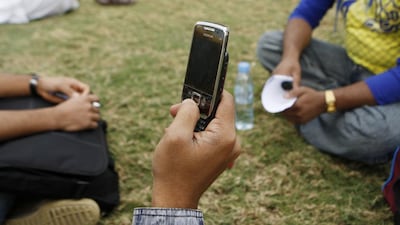In a relatively short span of time, smartphones and the internet have become a fact of life. But not for everyone and not everywhere. Not yet, at any rate. But this is changing. As The National reported in its Business section last week, an increasing number of smartphones are finding a place in the pockets of low-income earners in the UAE. That's mainly because they have become cheaper than ever before.
This will have one particularly significant consequence. These low-income smartphone-users will have access to mobile internet (wherever and whenever they find free wi-fi at least). This will mean that they can, if they’re minded to, go online and look for basic information on any and everything – swollen gums, say; a late-night pharmacy in the area; a storm approaching their hometown, perhaps in the Philippines; news of family and friends via social media. It’s worth noting that Facebook is popular among all income and linguistic groups. However, the benefits extend far beyond these few examples.
A more open and connected world will mean more growth and more opportunity. In Kenya and Uganda, for example, mobile technology is changing people’s lives because they can use their phones to bank and make money transanctions.
In essence, this is the logic that Mark Zuckerberg, CEO of Facebook, is working on with his internet.org app project. It’s a public-private partnership and was launched in Zambia last year to provide free access to basic internet services for everyone in that country. Last July, Mr Zuckerberg said the project had helped “three million people access the internet who had no access before.” He wants to extend this to the entire planet, which would give a whole new meaning to the words “world wide web”. In this country, the problem is thecost of mobile internet. But with more smartphones in the hands of people who can’t afford very much, there’s a need to make mobile internet cheaper. Ensuring that everyone has online access is no longer an option. It’s a necessity.
What the law says
Micro-retirement is not a recognised concept or employment status under Federal Decree Law No. 33 of 2021 on the Regulation of Labour Relations (as amended) (UAE Labour Law). As such, it reflects a voluntary work-life balance practice, rather than a recognised legal employment category, according to Dilini Loku, senior associate for law firm Gateley Middle East.
“Some companies may offer formal sabbatical policies or career break programmes; however, beyond such arrangements, there is no automatic right or statutory entitlement to extended breaks,” she explains.
“Any leave taken beyond statutory entitlements, such as annual leave, is typically regarded as unpaid leave in accordance with Article 33 of the UAE Labour Law. While employees may legally take unpaid leave, such requests are subject to the employer’s discretion and require approval.”
If an employee resigns to pursue micro-retirement, the employment contract is terminated, and the employer is under no legal obligation to rehire the employee in the future unless specific contractual agreements are in place (such as return-to-work arrangements), which are generally uncommon, Ms Loku adds.
Know your Camel lingo
The bairaq is a competition for the best herd of 50 camels, named for the banner its winner takes home
Namoos - a word of congratulations reserved for falconry competitions, camel races and camel pageants. It best translates as 'the pride of victory' - and for competitors, it is priceless
Asayel camels - sleek, short-haired hound-like racers
Majahim - chocolate-brown camels that can grow to weigh two tonnes. They were only valued for milk until camel pageantry took off in the 1990s
Millions Street - the thoroughfare where camels are led and where white 4x4s throng throughout the festival
Tips to stay safe during hot weather
- Stay hydrated: Drink plenty of fluids, especially water. Avoid alcohol and caffeine, which can increase dehydration.
- Seek cool environments: Use air conditioning, fans, or visit community spaces with climate control.
- Limit outdoor activities: Avoid strenuous activity during peak heat. If outside, seek shade and wear a wide-brimmed hat.
- Dress appropriately: Wear lightweight, loose and light-coloured clothing to facilitate heat loss.
- Check on vulnerable people: Regularly check in on elderly neighbours, young children and those with health conditions.
- Home adaptations: Use blinds or curtains to block sunlight, avoid using ovens or stoves, and ventilate living spaces during cooler hours.
- Recognise heat illness: Learn the signs of heat exhaustion and heat stroke (dizziness, confusion, rapid pulse, nausea), and seek medical attention if symptoms occur.
SPECS
Toyota land Cruiser 2020 5.7L VXR
Engine: 5.7-litre V8
Transmission: eight-speed automatic
Power: 362hp
Torque: 530Nm
Price: Dh329,000 (base model 4.0L EXR Dh215,900)
Defence review at a glance
• Increase defence spending to 2.5% of GDP by 2027 but given “turbulent times it may be necessary to go faster”
• Prioritise a shift towards working with AI and autonomous systems
• Invest in the resilience of military space systems.
• Number of active reserves should be increased by 20%
• More F-35 fighter jets required in the next decade
• New “hybrid Navy” with AUKUS submarines and autonomous vessels
MATCH INFO
Manchester City 3 (Silva 8' &15, Foden 33')
Birmginahm City 0
Man of the match Bernado Silva (Manchester City)

